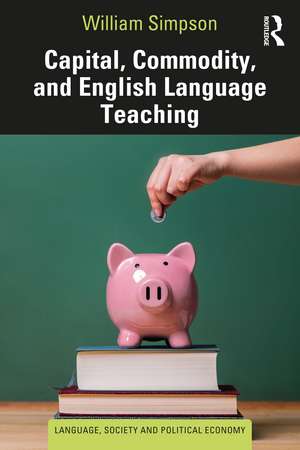Capital, Commodity, and English Language Teaching: Language, Society and Political Economy
Autor William Simpsonen Limba Engleză Paperback – 28 iul 2022
Simpson delivers a theoretically rigorous conception of capital and builds from this an investigation into how the circulation of capital for profit interrelates with the teaching of language. Simpson discusses ELT at both a global level, in discussion of the ELT industry in the UK, the US, Ireland, Canada, Japan, Spain, and transnationally online, as well as at a more local level, where finer detailed descriptions of the work-lives of those within the Japanese eikaiwa ELT industry are given. Drawing on a synthesis of Marxist and Bourdieusian theory, the book outlines a dialectical approach to understanding capital, and to understanding how the drive for profit and language education interrelate with one another. Simpson concludes by showing how such an approach might open up areas for further research in a number of contexts across the globe, as well as in light of the Covid-19 pandemic.
Providing a model for addressing global issues of ELT, this book is of interest to advanced students, scholars and professionals within applied linguistics, TESOL, sociolinguistics, and linguistic anthropology, language economics and related areas.
| Toate formatele și edițiile | Preț | Express |
|---|---|---|
| Paperback (1) | 287.71 lei 3-5 săpt. | +18.67 lei 7-11 zile |
| Taylor & Francis – 28 iul 2022 | 287.71 lei 3-5 săpt. | +18.67 lei 7-11 zile |
| Hardback (1) | 1005.01 lei 6-8 săpt. | |
| Taylor & Francis – 28 iul 2022 | 1005.01 lei 6-8 săpt. |
Din seria Language, Society and Political Economy
-
 Preț: 288.34 lei
Preț: 288.34 lei -
 Preț: 440.21 lei
Preț: 440.21 lei -
 Preț: 394.29 lei
Preț: 394.29 lei -
 Preț: 382.95 lei
Preț: 382.95 lei - 17%
 Preț: 258.89 lei
Preț: 258.89 lei -
 Preț: 351.11 lei
Preț: 351.11 lei -
 Preț: 389.66 lei
Preț: 389.66 lei
Preț: 287.71 lei
Nou
Puncte Express: 432
Preț estimativ în valută:
55.05€ • 57.48$ • 45.46£
55.05€ • 57.48$ • 45.46£
Carte disponibilă
Livrare economică 25 martie-08 aprilie
Livrare express 11-15 martie pentru 28.66 lei
Preluare comenzi: 021 569.72.76
Specificații
ISBN-13: 9780367764609
ISBN-10: 0367764601
Pagini: 232
Ilustrații: 1 Tables, black and white
Dimensiuni: 156 x 234 x 14 mm
Greutate: 0.35 kg
Ediția:1
Editura: Taylor & Francis
Colecția Routledge
Seria Language, Society and Political Economy
Locul publicării:Oxford, United Kingdom
ISBN-10: 0367764601
Pagini: 232
Ilustrații: 1 Tables, black and white
Dimensiuni: 156 x 234 x 14 mm
Greutate: 0.35 kg
Ediția:1
Editura: Taylor & Francis
Colecția Routledge
Seria Language, Society and Political Economy
Locul publicării:Oxford, United Kingdom
Public țintă
PostgraduateCuprins
Acknowledgements
Chapter 1. Working in Commercial ELT
Chapter 2. Commodity and Capital
Chapter 3. A Dialectical Approach to Contradiction in Language Work
Chapter 4. Dialectically Defining Eikaiwa
Chapter 5. Work in Commercial Eikaiwa
Chapter 6. Asking Questions of Value
Chapter 7. The Production of the Eikaiwa Lesson
Chapter 8. The Distribution of Value within Eikaiwa
Chapter 9. ‘Good Money for Someone, Not Teachers’: Class and the Fetishisation of Capital
Chapter 10. Towards a Political Economy of ELT Globally, and through the Covid 19 Pandemic
Appendix
Appendix I Transcription Conventions
Index
Chapter 1. Working in Commercial ELT
Chapter 2. Commodity and Capital
Chapter 3. A Dialectical Approach to Contradiction in Language Work
Chapter 4. Dialectically Defining Eikaiwa
Chapter 5. Work in Commercial Eikaiwa
Chapter 6. Asking Questions of Value
Chapter 7. The Production of the Eikaiwa Lesson
Chapter 8. The Distribution of Value within Eikaiwa
Chapter 9. ‘Good Money for Someone, Not Teachers’: Class and the Fetishisation of Capital
Chapter 10. Towards a Political Economy of ELT Globally, and through the Covid 19 Pandemic
Appendix
Appendix I Transcription Conventions
Index
Recenzii
"Teaching eikaiwa (English conversation) in Japan constitutes a large commercial industry that pursues capitalist profitmaking. Focusing on this marketplace, Simpson’s work uniquely illuminates teachers as precarious labourers being expected to produce Taylorised lessons and meet students’ satisfaction. The book provides an original perspective on the alienation of English teachers."
Ryuko Kubota, University of British Columbia, Canada
Ryuko Kubota, University of British Columbia, Canada
Notă biografică
William Simpson is a Junior Associate Professor of the Liberal Arts Department of Tokyo University of Science, Japan. He has published work on language education, ideology, and political economy in the Journal of Sociolinguistics, as well as in special issues of Language Sciences, and Language and Intercultural Communication.
Descriere
This book illustrates how the drive for profit in commercial ELT affects the manner in which language is taught, and is of interest to advanced students, scholars and professionals within applied linguistics, TESOL, sociolinguistics, and linguistic anthropology, language economics and related areas.
